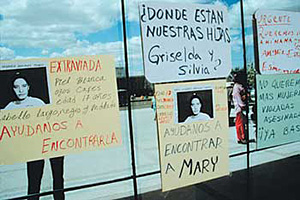 |
 |
 |
 Health & Beauty | January 2007 Health & Beauty | January 2007  
Resisting Femicide
 Ellen Snortland - pasadenaweekly.com Ellen Snortland - pasadenaweekly.com


| | (Amnesty Inernational) |
According to a report issued by Amnesty International in November, more than 400 women have been kidnapped and murdered over the past 14 years, many of them raped, mutilated and tortured first. One man couldn't possibly slaughter so many. It's gender terrorism. Is this a horror film tease? Tragically, no. The unsolved murders in Ciudad Juárez and the state of Chihuahua, Mexico, of mostly young and indigenous working-class women, are very real.

In Juárez, females of all backgrounds breathe terror, night and day. Is that man who just whispered “Mamacita” dangerous and sizing them up for abduction, or is he merely a nonlethal creep? Globally, the mysterious killings in Juárez have stumped and horrified us in the international women's rights community. Who is responsible? How can we resist femicide? What can be done?

What I'm doing is directing a documentary. I've noticed that almost all plans to prevent violence against women, whether local or global, exclude what a woman could possibly do DURING an attack to save herself. My documentary, “Beauty Bites Beast” (www.beautybitesbeast.org), will address many vital issues underlying the problem of violence against women but will focus on self-protection as a nongendered human right, a radical stance that my colleagues and I view as simple common sense.

Violence against women, a pandemic as maiming and fatal as any deadly microbe, is not unique to Mexico. It's global. Ironically, Juárez may ultimately be useful by shining a spotlight on the ubiquity of violence perpetrated against women. It often takes a particularly blatant example of deadly misogyny to focus attention on more banal crimes perpetrated daily against women and girls worldwide.

It was a no-brainer to include two self-defense advocates and instructors from London in my documentary: Claudia da Silva and Richard Chipping of LCPS, the London Centre for Personal Safety (www.londoncentreforpersonalsafety.org).

Da Silva and Chipping created Project Juárez, as their Web site states, “as a positive response to international concerns regarding the safety of Juárez women and the infringement of their human rights, which have been recorded by Amnesty International in their August 2003 report. Project Juárez is a joint partnership between LCPS, and Casa Amiga (www.casa-amiga.org), that has the support of Oxfam and Amnesty International.”

This past December, community activist, cinematographer and “Beauty Bites Beast” associate producer Maria Elena Chavez and I flew to Juárez and filmed da Silva and Chipping as they trained the staff and clients of Casa Amiga, one of the only rape and family crisis centers in Mexico. Local hero, women's rights pioneer and Casa Amiga founder Esther Chavez has led the campaign to make the femicide in Juárez an international issue. (Esther is no relation to Maria Elena Chavez, who is the daughter of United Farm Workers co-founder Dolores Huerta and niece of Cesar Chavez.) Esther has embraced full-force self-defense classes, recognizing how transformational they are for her employees and the women who live in the Casa Amiga shelter. Esther thinks globally and acts both globally and locally. She knows there's nothing more local than a woman's body and that it's essential that women learn to protect themselves.

Chipping and da Silva have had a difficult time raising funds for Project Juárez classes. The next step for Project Juárez is to train new instructors who live in Juárez. It's often difficult to convince people that teaching women self-defense might impact the mystery of Juárez. In a best-case scenario, if at least one woman fought back, she could save her own life and identify the attacker(s); in the worst case, she could leave evidence to help investigators. Consider the case of California serial rapist/murderer William L. Suff: the only woman who fought back bit his finger off, stopped his attack and created the break in the case that led to his arrest and conviction.

Chavez and the staff of Casa Amiga are on the front lines of the Ciudad Juárez nightmare, so they were hungry for self-defense classes. After their class, they were unanimous in their passion to make the classes available for anyone who wants them.

Women in Ciudad Juárez live in an atmosphere of almost constant terror. Learning simple yet basic self-protection skills is a transformational experience for women who have never said “No” to a man let alone learned simple skills that would debilitate an attacker enough to enable them to escape to safety. Knowing to throw dirt in an attacker's eyes could spell the difference between life and death — literally. The Juárez women want to know how to resist unwanted attention as well as attacks.

In an email from London, Chipping and da Silva wrote, “We very much hope your film will become a much-needed tipping point in getting the campaigns we need against the 'resistance' to women's physical self-defense training off the ground and getting established evidence-based, proven interventions to those women in such desperate and extreme need.” That's my hope too.
Dolores Huerta, an icon of the US farm worker and feminist movement, and I will be co-leading a workshop on ending violence against women on the second annual Ms. Magazine Cruise to the Caribbean. If you're interested in vacationing with some of the top leaders of the current US women's rights movement, visit www.msmagazine.com for more information. The cruise runs from Feb. 18 through 25. Contact Ellen at www.snortland.com | 
 | |
 |



